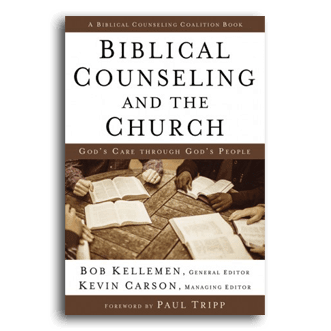⏱️ Estimated Reading Time: 8 min read
The Biblical Counseling Coalition’s new book, Biblical Counseling and the Church: God’s Care Through God’s People demonstrates the progress that has been made in the ministry of biblical counseling since Jay Adams’ initial exhortation to the church many years ago. The goal of the editors and contributors isn’t to give an apologetic for biblical counseling, although it does, rather it is to demonstrate that biblical counseling is a ministry for the church by the church. In other words, biblical counseling should be an equipping ministry.
Dr. Bob Kelleman and Dr. Kevin Carson, pastors and biblical counselors, have assembled over twenty ministry leaders who are dedicated to the local church to provide a practical guide on creating a culture of biblical counseling within the context of the local church. The wealth of wisdom contained in this resource cannot be overstated as the contributors bring many years of expertise together in one volume.
One of the distinguishing marks about this resource is that counseling ministry isn’t discussed theoretically or academically, but has been tested and applied in the local churches of the contributors. Far from just urging students and pastors to pursue some unattainable utopian view of biblical counseling, the contributors are giving an invitation to join them as they journey to serve God by faithfully serving his church. Collectively, it is as if the contributors are saying along with the Apostle Paul, “Be imitators of me, as I am of Christ” (1 Corinthians 11:1 ESV).
Biblical Counseling and the Church: God’s Care Through God’s People, can be used much like an encyclopedia, but unlike an encyclopedia, it’s extremely readable and pastoral in nature.
The four hundred plus page book is segmented into six different parts so that the reader can navigate easily through the text. Each part builds off the other, but can just as easily be read out of order or used as a quick reference when needed.
The appendices and bibliography account for sixty pages alone making this book even more valuable to the reader. One can quickly and easily find ample resources for further study and can use both the Scripture and subject index for a quick reference look up in the book.
One of the primary goals of the book is to equip church leaders to foster a church of biblical counseling rather than a church with biblical counseling. The book advocates this approach through small group ministry. Brad Bigney and Ken Long suggest that the purpose of small groups is “personal transformation” (93) by “changing and growing to be more like Christ” (93).
A church with biblical counseling has the potential to create a solo ministry that is fractured from all the other ministries in the church. On the contrary, a church of biblical counseling naturally conducted in the context of small group ministry creates a gospel-centered culture whose aim is to biblically care for one another. Because of their connection to the local church, the contributors understand that a culture of counseling doesn’t just happen overnight.
Contributors Bigney and Steve Viars stress the importance of biblical counseling becoming an equipping ministry for the local church: “Pastors should know that we’re not looking for spectators, people to fill the pews. We don’t need fans, and the church is not a Christian cruise ship, focused on how comfortable we can make our people. Ephesians 4:12 calls us to equip people to do ministry because the church is a battleship, on a mission, engaged in a spiritual war” (24).
Before small group leaders can be equipped to counsel one another in small group ministry, contributor Deepak Reju reminds the pastor-shepherd of his call to care for the flock faithfully and patiently: “To be a pastor means to do more than just stand in a pulpit on Sunday morning; it means shepherding God’s flock… to be a pastor and to be a shepherd is synonymous” (39). Therefore, creating a gospel-centered culture inside the local church committed to caring for one another must begin with the pastor in order to be an effective, Christ-centered ministry.
The trickle down effect that faithful pastoral ministry has on every other aspect of ministry in the local church is significant. A pastor who takes the charge to shepherd the flock faithfully will be committed to reproducing that passion. Small group leaders, much like the pastor, must be spiritually mature examples to the rest of the flock. The pastor should be dedicated to equipping them.
In addition to caring for and equipping the flock, the contributors of the book also present biblical counseling as an outreach ministry. This is significant in that most people who come to faith in Christ do so through relationships. The counselor/counselee relationship is a very appropriate and natural place for this to happen.
Contributors Carson and Randy Patten suggest, “many of the obstacles have been removed and the opportunities for success are great” (314). The gospel is central for those who are committed to counseling biblically. Christians are so prone to forget their identity and position in Christ and constantly need to be edified in the gospel.
The contributors of this book understand that if a Christian is prone to forget the gospel, how much more should the gospel be counseled to an unbeliever? This counseling approach should not vary much for the unbeliever. However, instead of reminding them of their position in Christ, the counselor is inviting them to see and savor who God is for them in Jesus.
Viewing the ministry of biblical counseling as a way to care for the church, an equipping ministry, and an outreach ministry is a holistic approach to the counseling and care of people presented in this volume. This approach demonstrates how much the ministry of biblical counseling has developed as the contributors continue to admonish pastors and churches for further development in this gospel work.
One of the primary strengths of this book is the contributor’s commitment to being specific. This book is not a birds-eye-view of biblical counseling nor is it a perfectly wrapped package with a bow on top. After reading through the book, one realizes that a commitment to this type of ministry is messy, tedious and time consuming.
The over twenty contributors give evidence to the hard labor that goes into this type of shepherding ministry. For instance, the type of leader training advocated for in this book is often neglected by most churches. Higbee advocates for two courses at his church called “Uncommon Leadership 101 and 201” (122). These courses aim to develop high level spiritually mature leaders who are competent to shepherd people. This is just one example that shows how dedicated the contributors are to the work of producing spiritually mature disciples through soul care.
One of the temptations that many church leaders succumb to is trying to shortcut the process of leadership development. This book is a great remedy for that temptation. Ron and Tim Allchin state, “Those equipping the counselors cannot allow the needs of hurting people to preempt helping your counselors grow in their own character. First, we must apply the principles from the Word to our own life if we expect to transfer them to others as disciples” (201).
Any church leader dedicated to developing a counseling ministry that is for the church by the church should read this book. I evaluated my own ministry throughout the duration of reading this book. I was encouraged that we place a tremendous emphasis on our small group ministry, but convicted by the lack of intentionality in training and developing spiritually mature leaders who are competent to counsel the gospel.
My conviction isn’t paralyzing because this book gives a great starting place to equip leaders to biblically care for God’s people. This book is a tool that can be frequently referenced in the discipleship process of a local church.
The editors and contributors for Biblical Counseling and the Church: God’s Care Through God’s People achieve their goal of developing and equipping pastors and leaders to counsel the gospel. This book is a valuable resource to every size local church and speaks specifically to the unchanging need all people have; the person and work of Jesus Christ.
The closing prayer of the contributors sum up the motive behind the book appropriately: “Father hear our prayer. We yearn for Your church to be awakened and to regain its confidence in the power of the gospel and the principles of Scripture to radically change lives” (426). Biblical Counseling isn’t an option for the faithful local church. Biblical Counseling is imperative in order to fulfill the Great Commission and this book communicates that clearly and passionately.




